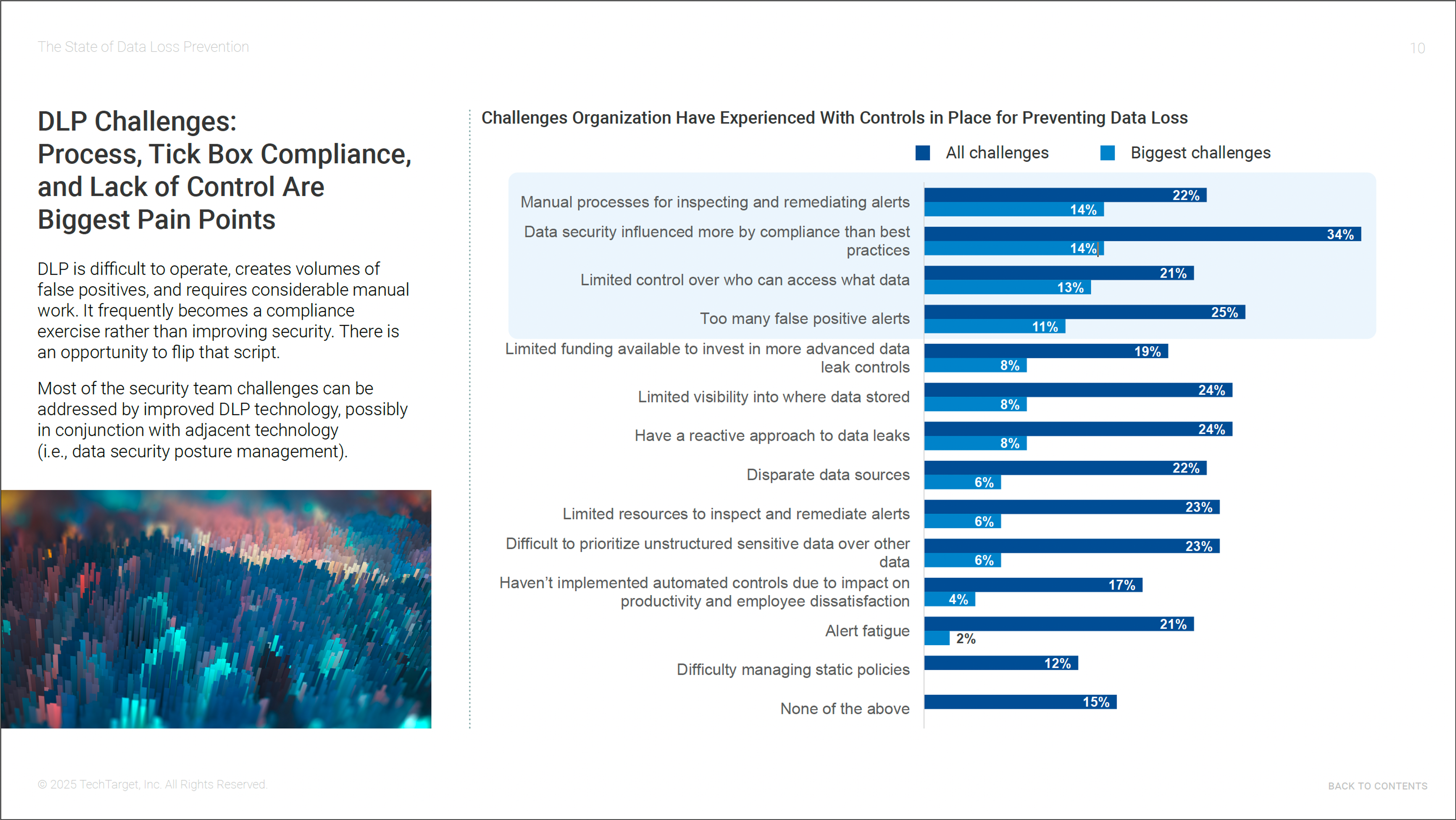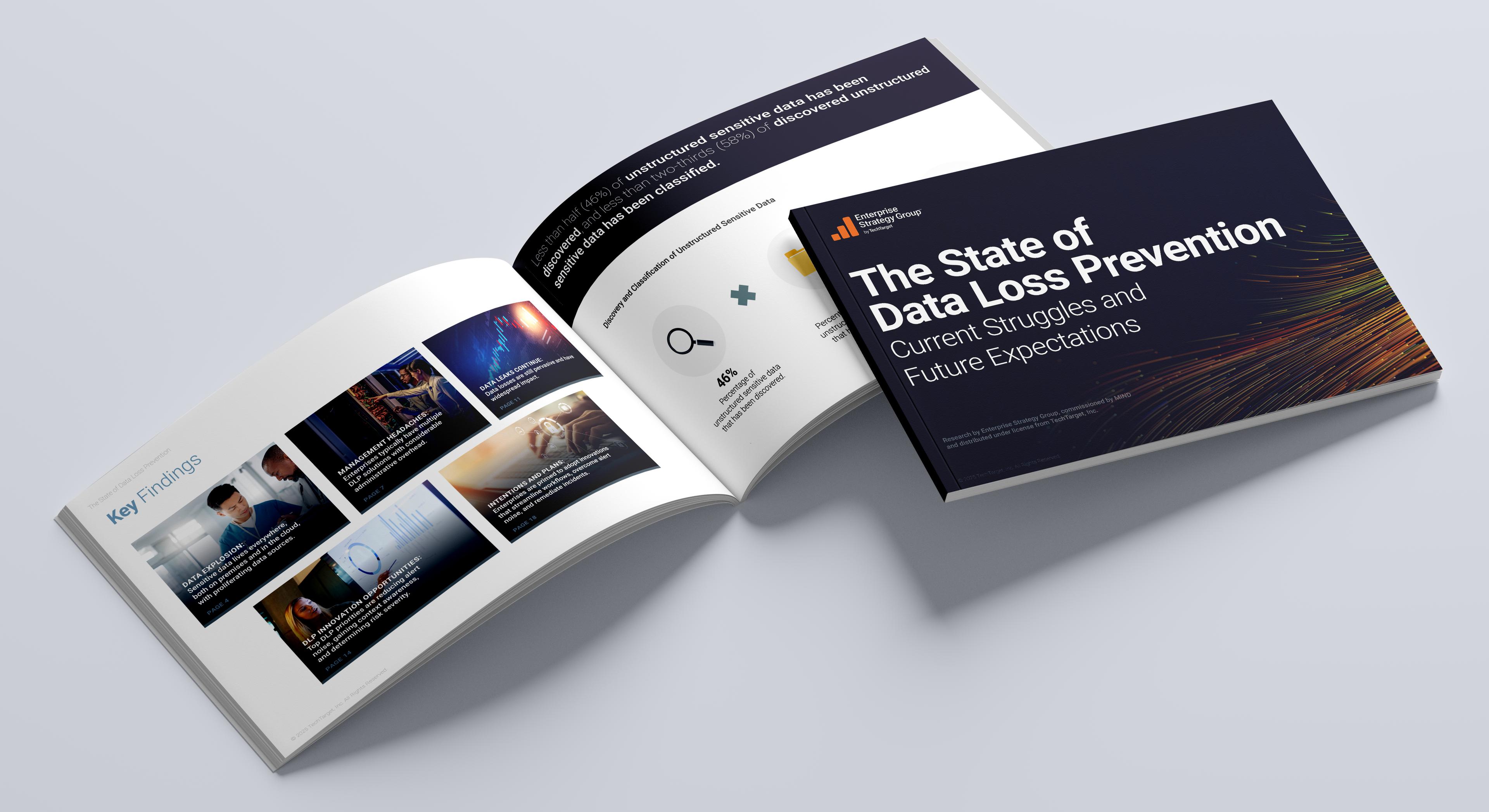Compliance isn't the easy button for data security
Compliance isn't the easy button for data security
For many organizations, compliance mandates drive data protection more than actual data security best practices. The State of Data Loss Prevention (DLP) Report from ESG and sponsored by MIND underscores a growing concern: compliance-driven security strategies create a false sense of protection while exposing organizations to real threats.
The Problem: Security that meets the minimum standard
Regulatory frameworks and cybersecurity insurance policies establish essential baselines for protecting sensitive data. However, the report highlights a significant disconnect between what compliance requires and what effective data security demands. The majority of security leaders surveyed identified compliance-driven data security as a major issue, with 14% ranking it as their single biggest challenge—making it the top concern among all reported issues.
Simply put, many organizations prioritize checking compliance boxes rather than implementing meaningful security measures that prevent sensitive data loss. This approach results in policies that look effective on paper but fail in practice.

The Disconnect: Why compliance alone isn’t enough
While compliance frameworks are critical in enforcing baseline security standards, they often fail to address modern data risks. Some of the key pain points security teams experience include:
- False sense of security: Organizations may assume that meeting compliance standards equates to comprehensive data security, but 53% of enterprises in the study experienced multiple data loss incidents in the past year, proving otherwise.
- Static and outdated controls: Compliance mandates often rely on policies that do not adapt to evolving threats, leaving businesses vulnerable.
- Alert fatigue and manual workloads: Legacy DLP solutions generate excessive false positives, requiring security teams to sift through noise rather than focusing on real risks.
- Limited visibility and context: Traditional compliance-driven solutions fail to provide a holistic view of sensitive data movement, making it difficult to differentiate between harmless activities and real threats.
The real cost of compliance-only security
A security strategy built solely around compliance not only increases the likelihood of data breaches but also has direct business consequences. The report found that organizations still struggle with insider risk management, cloud data security and protecting unstructured data despite following regulatory frameworks. When security policies are designed to satisfy auditors rather than proactively mitigate risk, companies face increased exposure to data breaches and leaks, higher operational costs due to inefficient security workflows, potential regulatory fines and legal liability, and reputational damage that erodes customer trust.
A Smarter Approach: Compliance + real security
Organizations need security solutions that bridge the gap between compliance and actual risk reduction. This is where MIND comes in. Unlike traditional DLP tools that focus solely on compliance requirements, MIND provides a context-aware, AI-driven approach that protects sensitive data before a breach occurs.
- Accurate discovery and classification: MIND continuously scans, classifies and protects sensitive data across SaaS apps, endpoints, on-premise servers and cloud environments. Compliance mandates were developed to secure the bare minimum of sensitive data for PII, PCI, PHI and others, and don’t cover those that can matter most to many organizations including intellectual property, credentials, cloud keys, financial statements and so much more.
- Context-aware protection: Instead of relying on rigid rule-based policies, MIND understands how and why data moves, ensuring smarter threat detection.
- Automated risk mitigation: Security teams spend 80% less time managing false positives, freeing them to focus on real threats..
- Seamless compliance and security: MIND ensures businesses meet regulatory requirements while also proactively and reactively protecting their data without adding unnecessary complexity.
The Bottom Line: Data security shouldn’t be just a compliance exercise
Compliance is essential, but it should be the floor, not the ceiling, of a strong data security strategy. The results from The State of DLP report confirm that organizations relying solely on compliance-based security are still experiencing data leaks, breaches and inefficiencies.
MIND helps companies go beyond compliance checkboxes to implement effective, intelligent DLP that actually protects sensitive data while ensuring regulatory alignment. Don’t settle for the illusion of security – ensure your organization is truly protected.
Download The State of DLP Report and see how you can rethink your approach to data security.










